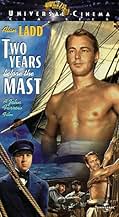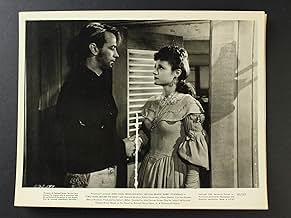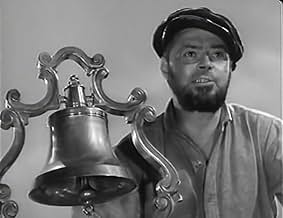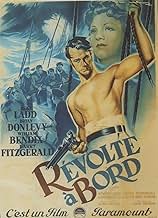IMDb RATING
6.9/10
588
YOUR RATING
The playboy son of a wealthy shipping magnate discovers at first hand the desperate privations suffered by the crew of one of his father's ships after he is unwillingly press-ganged aboard.The playboy son of a wealthy shipping magnate discovers at first hand the desperate privations suffered by the crew of one of his father's ships after he is unwillingly press-ganged aboard.The playboy son of a wealthy shipping magnate discovers at first hand the desperate privations suffered by the crew of one of his father's ships after he is unwillingly press-ganged aboard.
- Director
- Writers
- Stars
- Awards
- 3 wins total
- Director
- Writers
- All cast & crew
- Production, box office & more at IMDbPro
Featured reviews
This is a pretty fair movie about the mistreatment of seamen during the early 19th Century. However, it bears almost no resemblance to "Two Years Before the Mast". For a start, the credits say that the film is "based upon the novel by Richard Henry Dana". That, alone, is a pretty clear indication that nobody involved in the production of the movie had ever read the book because it was definitely NOT a novel. Dana was a college student at Harvard who took a sabbatical to ship out on a vessel belonging to the father of a friend of his in order to regain his health. The book was an account of his experiences, and it was NOT a work of fiction. There was no mutiny nor was anybody on board murdered. As a matter of fact, Dana did not even return on the ship started out on but on another ship that was homeward-bound, because the ship he sailed over on remained in California. Dana returned to Harvard, where he completed his studies and became a lawyer. During the course of his career he not only became an outspoken advocate not only for the rights of seamen, but for freedmen and fugitive slaves as well.
For the benefit of those who may wonder about the peculiar title, the term "before the mast" is an old term used on merchant ships to denotes sailing as a member of the crew, rather than as an officer or a passenger. The officers and passengers lived aft, in cabins. The crew lived up forward , not in cabins but in a single compartment that was originally called the "fore castle", but which was generally shortened to "focs'l". The "focs'l" was located at the forward end of the ship, forward of the masts, so that to sail "before the mast" was to be a seaman. Incidentally, although modern seamen live in individual staterooms, to this day many still refer to their stateroom as their "focs'l". Of course, none of the above applied to Navy ships, in which the officers lived in a "wardroom" and where there was no such thing as a "focs'l".
As a swashbuckling adventure movie "Two Years Before the Mast" compares favorably with others of that genre. However, those interested in the contents of Dana's book would be recommended not to take anything from this movie as representative of it.
For the benefit of those who may wonder about the peculiar title, the term "before the mast" is an old term used on merchant ships to denotes sailing as a member of the crew, rather than as an officer or a passenger. The officers and passengers lived aft, in cabins. The crew lived up forward , not in cabins but in a single compartment that was originally called the "fore castle", but which was generally shortened to "focs'l". The "focs'l" was located at the forward end of the ship, forward of the masts, so that to sail "before the mast" was to be a seaman. Incidentally, although modern seamen live in individual staterooms, to this day many still refer to their stateroom as their "focs'l". Of course, none of the above applied to Navy ships, in which the officers lived in a "wardroom" and where there was no such thing as a "focs'l".
As a swashbuckling adventure movie "Two Years Before the Mast" compares favorably with others of that genre. However, those interested in the contents of Dana's book would be recommended not to take anything from this movie as representative of it.
The press gang of the "Pilgrim" recruits a crew and the ship sets sail. Captain Thompson (Howard Da Silva) is only concerned with breaking speed records and has First Mate Amazeen (William Bendix) and Second Mate Foster (Luis Van Rooten) as his side-kicks to run discipline with a rod of iron. There are floggings, rations, neglect and heartless sea burials on his journey. The crew who suffer include Charles Stewart (Alan Ladd), Henry Dana (Brian Donlevy) and Brown (Albert Dekker). Dana keeps an incident log which will change merchant sea law forever. It becomes published and is called "Two Years Before The Mast"
This is a true-life account of conditions at the time and is based upon a book that introduced maritime law. The cast are all good - Howard Da Silva makes an excellent bad guy. I don't usually like children in films but the stowaway Sam Hooper (Daryl Hickman) isn't as annoying as I feared he might be, and his inclusion in the story has relevance in how the crew relate to Charles. Indeed, he also brings out a human side to Mr Amazeen. However, I am not sure what the point of having the 2 passengers was - the film dragged whenever Maria (Esther Fernandez) was on screen. It was good to watch Charles's transformation from a dislikeable oik to a man with a conscience. There were also some humorous moments thrown in, eg, when Charles goes back to eat the chicken he has stolen in front of the crew that hate him. It's a good film but I never understand the point in scrubbing the decks. What's that about?
This is a true-life account of conditions at the time and is based upon a book that introduced maritime law. The cast are all good - Howard Da Silva makes an excellent bad guy. I don't usually like children in films but the stowaway Sam Hooper (Daryl Hickman) isn't as annoying as I feared he might be, and his inclusion in the story has relevance in how the crew relate to Charles. Indeed, he also brings out a human side to Mr Amazeen. However, I am not sure what the point of having the 2 passengers was - the film dragged whenever Maria (Esther Fernandez) was on screen. It was good to watch Charles's transformation from a dislikeable oik to a man with a conscience. There were also some humorous moments thrown in, eg, when Charles goes back to eat the chicken he has stolen in front of the crew that hate him. It's a good film but I never understand the point in scrubbing the decks. What's that about?
This film rather than Shane marks the high point of Alan Ladd's golden Paramount years. By the time Shane was made, Ladd and agent/wife Sue Carol had made the decision to leave Paramount.
Sue picked a good one for her husband in Two Years Before the Mast. It's based on a book of the same title by Richard Henry Dana about his experiences aboard a typical American merchant vessel during the 1840s. Dana is played by Brian Donlevy and it is through his eyes that we see the action unfold.
As the film opens Ladd is the spoiled son of a rich merchant family. While out slumming with some of the 19th century brat pack he hangs out with, Ladd gets shanghaied aboard one of his father's own ships. That ship is commanded by an American version of Captain Bligh in Howard DaSilva.
DaSilva, who's career was to be interrupted by the blacklist shortly, is maybe the best one in this fine cast. He's a career naval officer who was cashiered and he runs his ship that way. Has the crew take gunnery practice even. The essence of that part is that he doesn't see himself as cruel. This is just the way things are at sea.
Barry Fitzgerald, like in the Sea Wolf, plays the ship's cook. But Dooley is 180 degrees different from the weasel Fitzgerald portrayed in The Sea Wolf. Shows his versatility as a player.
Bill Bendix was someone Ladd liked to have in his films if he could get him. He plays the tough, but respected first mate Amazine here. Bendix was in a different class than other character actors. He was a star on radio's and later television's Life of Riley and usually because of that, got roles with some depth. Even when the roles didn't, the talented Mr. Bendix put some depth in them.
The rest of the cast assembled to support Alan Ladd is a good one. Familiar folks like Albert Dekker, Frank Faylen, Luis Van Rooten, Ray Collins fill out their roles nicely.
One part is particularly poignant. Young Darryl Hickman is an office boy in Ladd's father's company and he stows away because he's filled with dreamy adolescent notions about life at sea. Despite all he sees around him and even what happens to him, young Hickman never loses sight of the fact that he's on a great adventure.
Considering the studio origins of the film, Paramount does a very good job in a realistic portrayal of life at sea. If you like sea stories, this one's a must.
Sue picked a good one for her husband in Two Years Before the Mast. It's based on a book of the same title by Richard Henry Dana about his experiences aboard a typical American merchant vessel during the 1840s. Dana is played by Brian Donlevy and it is through his eyes that we see the action unfold.
As the film opens Ladd is the spoiled son of a rich merchant family. While out slumming with some of the 19th century brat pack he hangs out with, Ladd gets shanghaied aboard one of his father's own ships. That ship is commanded by an American version of Captain Bligh in Howard DaSilva.
DaSilva, who's career was to be interrupted by the blacklist shortly, is maybe the best one in this fine cast. He's a career naval officer who was cashiered and he runs his ship that way. Has the crew take gunnery practice even. The essence of that part is that he doesn't see himself as cruel. This is just the way things are at sea.
Barry Fitzgerald, like in the Sea Wolf, plays the ship's cook. But Dooley is 180 degrees different from the weasel Fitzgerald portrayed in The Sea Wolf. Shows his versatility as a player.
Bill Bendix was someone Ladd liked to have in his films if he could get him. He plays the tough, but respected first mate Amazine here. Bendix was in a different class than other character actors. He was a star on radio's and later television's Life of Riley and usually because of that, got roles with some depth. Even when the roles didn't, the talented Mr. Bendix put some depth in them.
The rest of the cast assembled to support Alan Ladd is a good one. Familiar folks like Albert Dekker, Frank Faylen, Luis Van Rooten, Ray Collins fill out their roles nicely.
One part is particularly poignant. Young Darryl Hickman is an office boy in Ladd's father's company and he stows away because he's filled with dreamy adolescent notions about life at sea. Despite all he sees around him and even what happens to him, young Hickman never loses sight of the fact that he's on a great adventure.
Considering the studio origins of the film, Paramount does a very good job in a realistic portrayal of life at sea. If you like sea stories, this one's a must.
By several respects ,some kind of updated "Captain courageous" (Victor Fleming ,1937).The rich kid (Alan Ladd) has grown up and he is still frivolous ,part of the young jet set ,drinking and picking up girls in the low dives of the harbor.When dad learns that his boy is on his own ship,in the clutch of a -rather sadistic- captain ,he does not panic and wisely mumbles something like " it 'll make a man of him" ;which is not entirely false.Not only ,the boy born silver spoon in hand will learn the harsh realities of life ,but he'll also feel for his unfortunate shipmates (many of them poor press-ganged aboard victims like himself ).
Although the movie is centered on Ladd's misadventures ,it actually depicts "Henry Dana's crusade to expose mistreatment of men at sea" (Maltin).But the reviewer is wrong when he writes that it is a "badly scripted story":in fact only the female character gets in the way and the ending is botched.All that remains is absorbing ,the standout being for me the ship's boy.Farrow was better at film noir ,but his attempt at an adventures movies is recommendable.
Like this ? try these ....
"Mutiny on the Bounty" (Frank Lloyd's 1935 version is still the best) "Captain Courageous" (Fleming,1937) "Down to the sea in ships" (Henry Hathaway,1949) "Ghost Ship" (Mark Robson/Val Lewton,1943) "White squall" (Ridley Scott,1996)
Although the movie is centered on Ladd's misadventures ,it actually depicts "Henry Dana's crusade to expose mistreatment of men at sea" (Maltin).But the reviewer is wrong when he writes that it is a "badly scripted story":in fact only the female character gets in the way and the ending is botched.All that remains is absorbing ,the standout being for me the ship's boy.Farrow was better at film noir ,but his attempt at an adventures movies is recommendable.
Like this ? try these ....
"Mutiny on the Bounty" (Frank Lloyd's 1935 version is still the best) "Captain Courageous" (Fleming,1937) "Down to the sea in ships" (Henry Hathaway,1949) "Ghost Ship" (Mark Robson/Val Lewton,1943) "White squall" (Ridley Scott,1996)
This is a movie to see to get a feel for what it must have been like back in the "good old days" of tall ships and iron men. Lemme tell ya, the cruise ships of today are as far from "sailing" as a toy poodle is from a wolf.
This is one of my favorite movies, Alan Ladd is wonderful as the spoiled rich boy, while Howard Da Silva as the ruthless captain only interested in setting a new record around Cape Horn creates a new high-water mark for callousness. (What's with sea captains in Hollywood movies, anyway? If it's not the bumbling incompetence of Bogart's Queeg it's the cold heartlessness of Trevor Howard and Charles Laughton's Captain Bligh.) The stowaway kid (Darryl Hickman) is a bit over-the-top I admit, but it seems they all were in movies made back then. Speaking of back then, this baby is in black-and-white, and although some of the scenes in the various waterfront bars and in the hold of the ship benefit thereby, the outdoor scenes suffer a bit because of it. And speaking of outdoor scenes, they really didn't put much of the budget into special effects, as the boat looks exactly like what it is, a toy bobbing around in someone's bathtub.
Still, that's not why people love this movie. It's the fascination of watching Alan Ladd's Charles Stewart transformed from rich, obnoxious playboy into deeply affected human being as he watches the massive cruelty and abuse around him. The cruelty and virtual slavery of these sailors is portrayed with an unflinching eye, and you're cheering along with them when the final confrontation unfolds. As someone wiser than me observed, "Going to sea is going to jail, with a chance at drowning besides."
This is one of my favorite movies, Alan Ladd is wonderful as the spoiled rich boy, while Howard Da Silva as the ruthless captain only interested in setting a new record around Cape Horn creates a new high-water mark for callousness. (What's with sea captains in Hollywood movies, anyway? If it's not the bumbling incompetence of Bogart's Queeg it's the cold heartlessness of Trevor Howard and Charles Laughton's Captain Bligh.) The stowaway kid (Darryl Hickman) is a bit over-the-top I admit, but it seems they all were in movies made back then. Speaking of back then, this baby is in black-and-white, and although some of the scenes in the various waterfront bars and in the hold of the ship benefit thereby, the outdoor scenes suffer a bit because of it. And speaking of outdoor scenes, they really didn't put much of the budget into special effects, as the boat looks exactly like what it is, a toy bobbing around in someone's bathtub.
Still, that's not why people love this movie. It's the fascination of watching Alan Ladd's Charles Stewart transformed from rich, obnoxious playboy into deeply affected human being as he watches the massive cruelty and abuse around him. The cruelty and virtual slavery of these sailors is portrayed with an unflinching eye, and you're cheering along with them when the final confrontation unfolds. As someone wiser than me observed, "Going to sea is going to jail, with a chance at drowning besides."
Did you know
- TriviaAccording to Howard Da Silva in Alan Ladd's biography, Ladd and William Bendix did not talk to each other although they were friends. Between the scenes everyone went their separate ways.
- Quotes
Captain Francis A. Thompson: Mr. Foster, remove his shirt.
2nd Mate Foster: Aye, aye, sir.
Charles Stewart: Never mind. I'll take it off.
- ConnectionsReferenced in King Leonardo and His Short Subjects: Anchors Awry or Nautical Nut (1961)
- SoundtracksTake Back the Heart
Written by Claribel (Charlotte Arlington Barnard) and Mrs. G.R. Gifford
- How long is Two Years Before the Mast?Powered by Alexa
Details
- Release date
- Country of origin
- Languages
- Also known as
- Two Years Before the Mast
- Filming locations
- Production company
- See more company credits at IMDbPro
Box office
- Budget
- $2,000,000 (estimated)
- Runtime1 hour 38 minutes
- Color
- Aspect ratio
- 1.37 : 1
Contribute to this page
Suggest an edit or add missing content

























